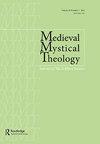If We Cannot Know it All, Why Know at All? Exploring, through Thomas Aquinas and Nicholas of Cusa, the Reason Why God Cannot be Named
IF 0.3
0 RELIGION
引用次数: 0
Abstract
ABSTRACT Drawing upon Thomas Aquinas’ Summa Theologiae and Nicholas of Cusa’s On Learned Ignorance, I discuss the significance of naming God and whether the attempt to understand Him by doing so is a redundant pursuit. I explore the implications of God’s simplicity and our reasoning. I focus on the significance of Cusa’s learned ignorance, Aquinas’s analogical perfections, and how we may understand God’s Unity prior to differentiable otherness by understanding in terms of potential. I then demonstrate how we can become unified with all possibilities, impossibilities, knowns, unknowns, and left open to fully realise the simplicities inherent within and prior to the effect of our cause. This allows us to obtain a perfect [self] awareness, analogical or connected to that perfect knowledge only God has of Himself, and which He has expressed through the language of actualisation. I close by arguing that we may analogically express God, but cannot name Him.如果我们不能无所不知,为什么还要无所不知?通过托马斯·阿奎那和库萨的尼古拉斯探索上帝无法命名的原因
借鉴托马斯·阿奎那的《神学总论》和尼古拉斯·库萨的《博学的无知》,我将讨论命名上帝的意义,以及通过这样做来理解上帝的尝试是否是一种多余的追求。我探索了上帝的简单性和我们的推理的含义。我关注库萨的博学无知的重要性,阿奎那的类比完美,以及我们如何通过理解潜能来理解上帝的统一性,而不是差异性。然后,我将展示我们如何与所有的可能性、不可能性、已知、未知统一起来,并充分认识到我们的原因内在和之前的结果的简单性。这使我们获得一种完美的[自我]意识,类似于或连接到只有上帝对他自己的完美知识,他通过实现的语言表达出来。最后,我认为我们可以类比地表达上帝,但不能说出他的名字。
本文章由计算机程序翻译,如有差异,请以英文原文为准。
求助全文
约1分钟内获得全文
求助全文

 求助内容:
求助内容: 应助结果提醒方式:
应助结果提醒方式:


